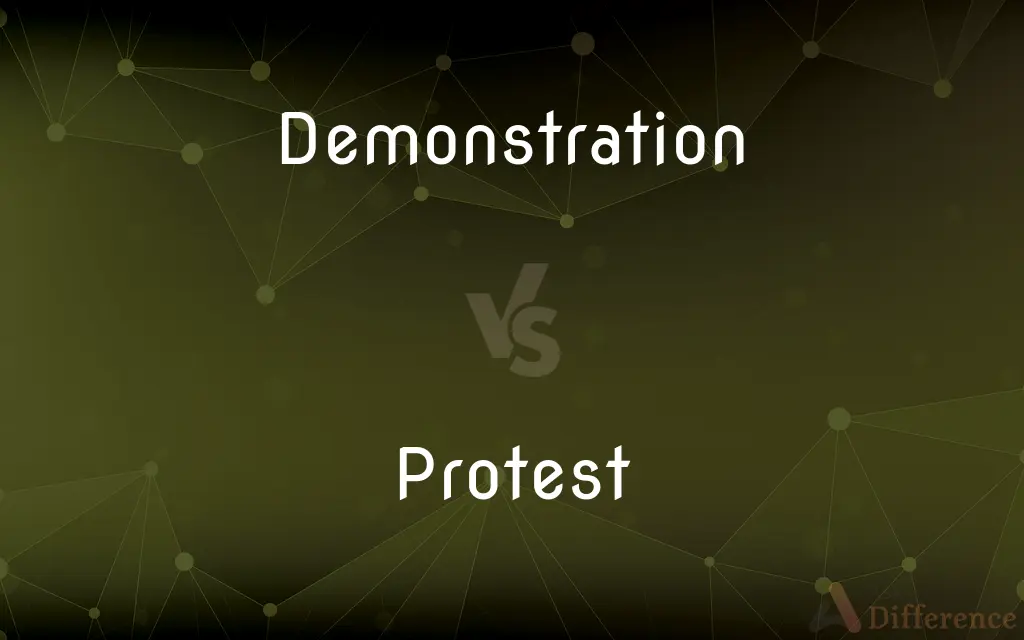Demonstration vs. Protest — What's the Difference?
Edited by Tayyaba Rehman — By Maham Liaqat — Updated on March 29, 2024
A demonstration is a public display of group opinion, often neutral or supportive, while a protest is a demonstration expressing opposition or disapproval.

Difference Between Demonstration and Protest
Table of Contents
ADVERTISEMENT
Key Differences
Demonstrations are organized public gatherings where individuals collectively show their stance on various issues, which can range from support for a policy to advocacy for social change. They are characterized by their broader intent to showcase a group's opinion or promote awareness. On the other hand, protests are a subset of demonstrations specifically aimed at expressing dissent, opposition, or disapproval towards an idea, policy, or situation. While all protests are demonstrations, not all demonstrations are protests.
Demonstrations serve various purposes, such as celebrating achievements, raising awareness on social issues, or showing solidarity with a cause. They might involve marches, rallies, or silent vigils, depending on their objectives. Protests, however, inherently carry a tone of confrontation or demand for change, often in response to specific grievances or injustices. They are marked by slogans, chants, and sometimes civil disobedience, aiming to challenge the status quo.
The nature of a demonstration can be peaceful and celebratory, highlighting positive advocacy or support for an initiative. For instance, a demonstration might involve a march to celebrate a historical milestone or to advocate for environmental conservation. In contrast, protests are more likely to involve conflict and direct opposition, such as objecting to government policies, corporate practices, or societal norms deemed unjust by the participants.
Public perception and media coverage of demonstrations and protests can vary significantly. Demonstrations, especially those with a positive or neutral message, often receive supportive or neutral coverage. Protests, especially if they involve clashes with law enforcement or disruption of public services, can receive more critical or controversial attention.
Both demonstrations and protests play crucial roles in democratic societies by providing a platform for public expression and influencing public opinion and policy. While their methodologies and motivations might differ, they underscore the importance of civic engagement and the exercise of freedom of assembly and speech.
ADVERTISEMENT
Comparison Chart
Definition
Public display of group opinion, often neutral or supportive
Demonstration expressing opposition or disapproval
Tone
Can be neutral, supportive, celebratory
Confrontational, demanding change
Objectives
Showcase opinion, raise awareness, show solidarity
Express dissent, demand action or change
Examples
Marches, rallies, vigils for various causes
Rallies, sit-ins against policies, injustices
Public Perception
Often positive or neutral
Can be controversial or critical
Compare with Definitions
Demonstration
Public showing of support or opinion.
The demonstration in favor of climate action drew thousands.
Protest
Public expression of objection.
The protest against the new law gathered at the city hall.
Demonstration
Vigil to honor or remember.
A candlelight demonstration was held to remember the victims.
Protest
Rally to demand change.
Environmental activists organized a protest to demand policy reforms.
Demonstration
Assembly to showcase solidarity.
The community held a demonstration in support of healthcare workers.
Protest
March opposing governmental actions.
A large protest marched through downtown opposing the policy.
Demonstration
March or rally for a cause.
Participants held a demonstration to celebrate scientific achievements.
Protest
Sit-in against injustices.
Students staged a protest demanding equality in education.
Demonstration
Gathering to raise awareness on issues.
The city saw a peaceful demonstration promoting peace.
Protest
Civil disobedience for rights.
The group's protest involved blocking roads to highlight their demands.
Demonstration
The act or process of providing evidence for or showing the truth of something
A demonstration of the drug's efficacy.
A demonstration of the theorem.
Protest
A protest (also called a demonstration, remonstration or remonstrance) is a public expression of objection, disapproval or dissent towards an idea or action, typically a political one. Protests can take many different forms, from individual statements to mass demonstrations.
Demonstration
An illustration or explanation, as of a theory or product, by exemplification or practical application
A demonstration of ballroom dancing.
Protest
To express a strong objection to (something)
Protest a job assignment.
Demonstration
A piece of evidence
That car he bought is supposed to be a demonstration of his commitment to clean energy.
Protest
To participate in a public demonstration in opposition to (something)
Thousands protested the election fraud.
Demonstration
An expression or manifestation, as of one's feelings
A demonstration of her displeasure.
Protest
To promise or affirm earnestly, as after being doubted
"He continually protested his profound respect" (Frank Norris).
Demonstration
A public display of group opinion, as by a rally or march
Peace demonstrations.
Protest
(Law) To declare an objection and reservation of rights of (a claim being made) while taking an action that would otherwise imply consent or agreement.
Demonstration
The act of demonstrating; showing or explaining something.
Protest
(Archaic) To proclaim or make known
"unrough youths that even now / Protest their first of manhood" (Shakespeare).
Demonstration
(prison slang) A prisoner's act of beating up another prisoner. en
Protest
To express a strong objection.
Demonstration
An event at which something will be demonstrated.
I have to give a demonstration to the class tomorrow, and I'm ill-prepared.
Protest
To participate in a public demonstration in opposition to something.
Demonstration
Expression of one's feelings by outward signs.
Protest
To make an earnest avowal or affirmation.
Demonstration
A public display of group opinion, such as a protest march.
Protest
A formal declaration of disapproval or objection issued by a concerned person, group, or organization.
Demonstration
A show of military force.
Protest
A public demonstration or organized effort to show disapproval about something, especially a governmental policy or practice.
Demonstration
A proof.
Protest
(Law) A declaration of objection and reservation of rights, made when action would otherwise imply consent or agreement
Payment under protest.
Demonstration
The act of demonstrating; an exhibition; proof; especially, proof beyond the possibility of doubt; indubitable evidence, to the senses or reason.
Those intervening ideas which serve to show the agreement of any two others are called "proofs;" and where agreement or disagreement is by this means plainly and clearly perceived, it is called demonstration.
Protest
(intransitive) To make a strong objection.
How dare you, I protest!
The public took to the streets to protest over the planned change to the law.
Demonstration
An expression, as of the feelings, by outward signs; a manifestation; a show. See also sense 7 for a more specific related meaning.
Did your letters pierce the queen to any demonstration of grief?
Loyal demonstrations toward the prince.
Protest
(transitive) To affirm (something).
I protest my innocence.
I do protest and declare
Demonstration
The exhibition and explanation of a dissection or other anatomical preparation.
Protest
To object to.
They protested the demolition of the school.
Demonstration
Mil.) a decisive exhibition of force, or a movement indicating an attack.
Protest
To call as a witness in affirming or denying, or to prove an affirmation; to appeal to.
Demonstration
The act of proving by the syllogistic process, or the proof itself.
Protest
To make a solemn written declaration, in due form, on behalf of the holder, against all parties liable for any loss or damage to be sustained by non-acceptance or non-payment of (a bill or note). This should be made by a notary public, whose seal it is the usual practice to affix.
Demonstration
A course of reasoning showing that a certain result is a necessary consequence of assumed premises; - these premises being definitions, axioms, and previously established propositions.
Protest
To publish; to make known.
Demonstration
A public gathering of people to express some sentiment or feelings by explicit means, such as picketing, parading, carrying signs or shouting, usually in favor of or opposed to some action of government or of a business.
Protest
A formal objection, especially one by a group.
They lodged a protest with the authorities.
Demonstration
The act of showing how a certain device, machine or product operates, or how a procedure is performed; - usually done for the purpose of inducing prospective customers to buy a product; as, a demonstration of the simple operation of a microwave oven.
Protest
A collective gesture of disapproval; a demonstration.
We held a protest in front of City Hall.
Demonstration
A show or display; the act of presenting something to sight or view;
The presentation of new data
He gave the customer a demonstration
Protest
The noting by a notary public of an unpaid or unaccepted bill.
Demonstration
A show of military force or preparedness;
He confused the enemy with feints and demonstrations
Protest
A written declaration, usually by the master of a ship, stating the circumstances attending loss or damage of ship or cargo, etc.
Demonstration
A public display of group feelings (usually of a political nature);
There were violent demonstrations against the war
Protest
To affirm in a public or formal manner; to bear witness; to declare solemnly; to avow.
He protest that his measures are pacific.
The lady doth protest too much, methinks.
Demonstration
Proof by a process of argument or a series of proposition proving an asserted conclusion
Protest
To make a solemn declaration (often a written one) expressive of opposition; - with against; as, he protest against your votes.
The conscience has power . . . to protest againts the exorbitancies of the passions.
Demonstration
A visual presentation showing how something works;
The lecture was accompanied by dramatic demonstrations
The lecturer shot off a pistol as a demonstration of the startle response
Protest
To make a solemn declaration or affirmation of; to proclaim; to display; as, to protest one's loyalty.
I will protest your cowardice.
Protest
To call as a witness in affirming or denying, or to prove an affirmation; to appeal to.
Fiercely [they] opposedMy journey strange, with clamorous uproarProtesting fate supreme.
Protest
A solemn declaration of opinion, commonly a formal objection against some act; especially, a formal and solemn declaration, in writing, of dissent from the proceedings of a legislative body; as, the protest of lords in Parliament.
Protest
A solemn declaration in writing, in due form, made by a notary public, usually under his notarial seal, on behalf of the holder of a bill or note, protesting against all parties liable for any loss or damage by the nonacceptance or nonpayment of the bill, or by the nonpayment of the note, as the case may be.
Protest
A formal and solemn declaration of objection;
They finished the game under protest to the league president
The senator rose to register his protest
The many protestations did not stay the execution
Protest
The act of protesting; a public (often organized) manifestation of dissent
Protest
The act of making a strong public expression of disagreement and disapproval;
He shouted his protests at the umpire
A shower of protest was heard from the rear of the hall
Protest
Utter words of protest
Protest
Express opposition through action or words;
Dissent to the laws of the country
Protest
Affirm or avow formally or solemnly;
The suspect protested his innocence
Common Curiosities
Can demonstrations turn into protests?
Yes, demonstrations can evolve into protests if participants decide to take a more confrontational stance to express dissent.
What makes a protest effective?
A protest becomes effective when it successfully raises public awareness, influences public opinion, or leads to policy changes.
Are protests legal?
Protests are legal in many democratic countries as part of the right to free speech and assembly, though they may be subject to regulations and permits.
Why do people participate in demonstrations?
People participate in demonstrations to publicly express their opinions, raise awareness, and advocate for causes they believe in.
What historical protests have led to significant changes?
Historical protests like the Civil Rights Movement in the USA and the Anti-Apartheid Movement in South Africa have led to major societal changes.
What role do social media play in demonstrations and protests?
Social media plays a critical role in organizing, publicizing, and sharing information about demonstrations and protests.
How are demonstrations and protests organized?
Both are organized through planning by groups or organizations, mobilizing participants via social media, community networks, and public calls to action.
Can protests lead to violence?
While many protests are peaceful, some can lead to clashes between participants and authorities, or between different groups.
Can individuals organize protests?
Individuals can and often do initiate protests, though larger movements are typically organized by groups or coalitions.
How do authorities typically respond to protests?
Responses can vary from supportive protection of participants to enforcement actions if a protest is deemed unlawful or disruptive.
What is civil disobedience?
Civil disobedience is a form of protest involving the deliberate and public violation of laws to highlight an issue or injustice.
How do demonstrations and protests impact society?
They can significantly impact society by highlighting issues, shaping public discourse, and sometimes leading to legislative or societal changes.
Do demonstrations and protests differ globally?
Yes, the nature, reception, and impact of demonstrations and protests can vary widely across different cultural and political contexts.
How do news media influence the perception of protests?
Media coverage can shape public perception by highlighting the motives, actions, and responses associated with protests.
What challenges do organizers of protests face?
Organizers face challenges such as securing permits, ensuring participant safety, and achieving media coverage and public support.
Share Your Discovery

Previous Comparison
Sing vs. Singe
Next Comparison
Chad vs. SimpAuthor Spotlight
Written by
Maham LiaqatEdited by
Tayyaba RehmanTayyaba Rehman is a distinguished writer, currently serving as a primary contributor to askdifference.com. As a researcher in semantics and etymology, Tayyaba's passion for the complexity of languages and their distinctions has found a perfect home on the platform. Tayyaba delves into the intricacies of language, distinguishing between commonly confused words and phrases, thereby providing clarity for readers worldwide.














































